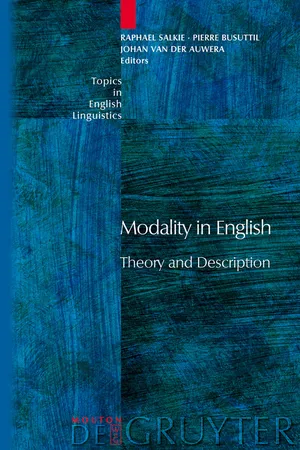
Modality in English
Theory and Description
- 390 pages
- English
- PDF
- Available on iOS & Android
Modality in English
Theory and Description
About this book
This volume presents two kinds of studies on English modality.
On the one hand, there are strongly empirical, corpus-based studies of individual uses of English modal auxiliaries and modal constructions, such as may in interrogatives, might in concessive clauses, shall and may vs must in legal English, the use of surprised if and surprising if constructions, the use and history of adhortative constructions, or the modal-aspectual use of come to in I came to realize that X. The book also contains work that presents new views on some of the classical issues, like the relations between modality and time, modality and commitment, modals and (inter)subjectivity. A special place is given to work that approaches the English modals from the perspective of the 'Theory of Enunciative Operations' developed by the French linguist Antoine Culioli and his colleagues.
Thus the book provides new perspectives and answers on basic questions about modality, in general, and its expression in English, in particular.
Frequently asked questions
- Essential is ideal for learners and professionals who enjoy exploring a wide range of subjects. Access the Essential Library with 800,000+ trusted titles and best-sellers across business, personal growth, and the humanities. Includes unlimited reading time and Standard Read Aloud voice.
- Complete: Perfect for advanced learners and researchers needing full, unrestricted access. Unlock 1.4M+ books across hundreds of subjects, including academic and specialized titles. The Complete Plan also includes advanced features like Premium Read Aloud and Research Assistant.
Please note we cannot support devices running on iOS 13 and Android 7 or earlier. Learn more about using the app.
Information
Table of contents
- Frontmatter
- Contents
- Introduction
- Towards a typology of modality in language
- ‘Not-yet-factual at time t’: a neglected modal concept
- Semantic ascent, deixis, intersubjectivity and modality
- Degrees of modality
- Another look at modals and subjectivity
- For a topological representation of the modal system of English
- Epistemic might in the interrogative
- MAY in concessive contexts
- When may means must: deontic modality in English statute construction
- Legal English and the ‘modal revolution’
- Posteriority in expressions with must and have to: a case of interplay between syntax, semantics and pragmatics
- Using the adjectives surprised/surprising to express epistemic modality
- Commitment and subjectivity in the discourse of a judicial inquiry
- Hearsay adverbs and modality
- When Yes means No, and other hidden modalities
- Modality and the history of English adhortatives
- On the “great modal shift” sustained by come to VP
- Backmatter